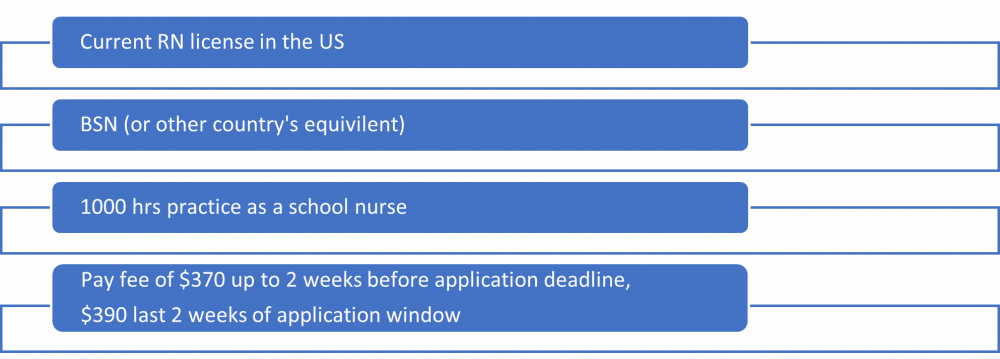Eligibility & Readiness

Documentation Required
- Proof of license as a registered nurse (RN) in one of the United States.
- Academic transcript or proof of current certification, demonstrating one of the following:
- A bachelor’s degree or higher in nursing or the equivalent in other countries (If you completed your education outside of the U.S., you must submit verification of your international credentials obtained through a certified evaluation service.) Why is a BSN required?
- A master’s degree in education with a concentration in school nursing or school health services from an NBCSN approved, accredited institution. Contact info@nbcsn.org with information about specific programs (not every program will qualify).
- Note on letterhead from your supervisor or district official confirming the clinical practice requirement of a minimum of 1,000 hours worked within the three years prior to taking the test. 1000 hours is roughly equivalent to a full-time school nurse working at least 6 hours/day for a school year of 180 days. See the "Clinical Practice Requirements" below for more information about clinical practice requirements.
AND
- RECERTIFICATION ONLY - Current certification by NBCSN as an NCSN. Retaking the exam can be used in lieu of other requirements for recertification.
- Complete the online application.
- Pay the required fee.
Additional Eligibility Requirements
- Baccalaureate degrees must be granted from programs that are accredited by national, regional, or state accrediting boards of higher education through the Council for Higher Education Accreditation or listed as an accredited program by the U.S. Department of Education.
- Registered nurses enrolled in Masters Programs (RN-MSN) that do not confer bachelor’s degrees may NOT apply to take the NCSN Examination until completion of the graduate program.
- Candidates with foreign educational degrees must submit validated transcripts with both general academic and professional licensure evaluation reports from an accredited foreign educational credential evaluation service indicating the degree is equivalent to an accredited program in the United States, such as those with memberships in the National Association of Credential Evaluation Services (NACES).
Clinical Practice Requirements
- Clinical Practice in school nursing means employed or contracted (including self-employed) to provide a direct or indirect professional contribution to the health and education of students and their families in public or private school settings and includes continuing professional responsibility and accountability for the outcomes of these actions.
- Direct clinical practice in school nursing uses the nursing process in a school setting with a student, group of students, families, or school community.
- Indirect clinical practice includes:
- Clinical supervision of school nurses, education and clinical supervision of baccalaureate/master’s nursing students in school health, including providing NCPD OR
- Administration of school health services, research, consultation or other engagement in the field of school nursing that contributes to the specialty’s body of knowledge or enhances the quality of school nursing practice.
- Not eligible as clinical practice in school nursing includes:
- One-to-one nursing as the nurse’s sole responsibility within a school;
- Employment in the direct sales, marketing or distribution of school nursing-related products or pharmaceutical services;
- Technology or other school health-related industries;
- Community health screenings;
- Work in a camp setting;
- Preceptorship/mentor and;
- Jobs unrelated to school nursing.
Eligibility Versus Readiness to Take the Exam
Eligibility should not be confused with readiness. While some school nurses may be ready to take the exam after meeting the minimum eligibility criteria, others may require more clinical experience and exam preparation.
Please see the exam preparation page for suggested approaches to studying. Factors that may affect your readiness include:
- level of education
- formal coursework in school nursing and education systems
- nursing experience prior to school nursing (e.g., child and adolescent primary care and public health versus adult inpatient nursing)
- exposure to child health in age ranges outside of school assignment
- continuing education
- supervision by a school nurse administrator
- on the job reference materials
- formal or informal mentoring
- professional development and professional leadership provided within the school district and state.
Appeals of Eligibility Requirements
- If you are found ineligible to sit for the exam but believe you meet eligibility requirements, you may petition the NBCSN President by submitting a letter of appeal with supporting documentation to info@nbcsn.org.
- Any documentation requested by NBCSN members or management company staff will be at your expense.
- Appeals must include:
- a transcript of your baccalaureate degree with all courses listed,
- a transcript of other courses taken,
- a current resume, and
- a description of activities related to school health services.
- No letters of reference shall be accepted.
- NBCSN will notify you about your appeal within 30 days of receipt of all requested documentation.
- The NBCSN appeals committee makes all decisions on eligibility appeals.
The appeals committee’s decision is final.
Why is a BSN Required?
NBCSN endorses the NASN and ANA recommendations for school nurse practice. According to the School Nursing Scope and Standards of Practice 4th ed. (p.27):
“Educational preparation for school nurse varies, however, the broad scope of the specialty practice of school nursing, and the complexity of issues addressed within a school community setting by the school nurse require advanced skills. These include the ability to practice independently, supervise others, apply community health concepts, manage programs, and delegate care. Therefore, the NASN recommends, and the ANA has consistently affirmed, that the minimal educational preparation for a school nurse be a Bachelor of Science degree in Nursing (BSN) from an accredited college or university. BSNs are significantly better prepared in 12 out of 16 practice areas related to quality and safety including evidence-based practice (EBP), data analysis, and project implementation; therefore, could improve and safeguard the quality of patient care.”
National Association of School Nurses (2022). School nursing scope and standards of practice. National Association of School Nurses.
